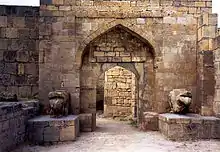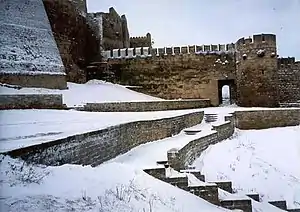Storming of Derbent
The Storming of Derbent (Russian: Штурм Дербента) took place on 10 May 1796 during the Persian Expedition of 1796. Derbent, an ancient city with thick walls has a favorable geopolitical position, which locks the coastal passage between the Caucasus Mountains and the Caspian.
| Persian Expedition of 1796 | |||||||
|---|---|---|---|---|---|---|---|
| Part of Russo-Persian War (1796) | |||||||
| |||||||
| Belligerents | |||||||
|
|
| ||||||
| Commanders and leaders | |||||||
|
|
| ||||||
| Strength | |||||||
| 12,300 soldiers, 21 cannons.[2] | 10,000 soldiers.[3] | ||||||
| Casualties and losses | |||||||
| 11 officers, 107 soldiers killed and wounded | unknown | ||||||
Background


In the spring of 1795, the Persians, led by the new ruler and founder of the Qajar dynasty, Agha Mohammad Khan Qajar, re-subjugated eastern Georgia (recently unified as the Kingdom of Kartli-Kakheti) and the khanates of the region. In carrying out its obligations under the Treaty of Georgievsk of 1783, the Russian government sent a large army (about 13 thousand) from Kizlyar towards the Iranian possessions in the Caucasus.
For the subsequent hike in 1796, a strong Russian corps of two infantry and two cavalry battalions had been formed in Kizlyar. Command was given to Pavel Tsitsianov, Bulgakov, Alexander Korsakov, Baron Levin August, Count Stepan Apraksin, and Matvei Platov, while the commander-in-chief was Lieutenant-General Count Valerian Zubov.
Storming
The Russians offered Shakyh-Ali Khan Darbandi, the Iranian governor of the town, to collaborate against the shah. But the young Sheikh-Ali Khan left the letter unanswered, and therefore the city was met with a barrage of Russian cannon shots.
On 10 May, the city was captured.[1]
The capture of Derbent by Zuvov was glorified by the Russian court poet Derzhavin in his poem Na Pokorenie Derbenta ("on the conquest of Derbent").[4]
Aftermath
Empress Catherine waxed jubilant at Zubov's rapid progress, which in two months had exceeded the gains of Peter the Great's costly Persian campaign in two years.[5] Sheikh Ali Khan, the governor of Derbent was taken prisoner, which broke the spirit of resistance of the locals. Despite this success, when Paul I ascended the Russian throne, foreign policy changed, and the Russian troops were withdrawn from the Caucasus (in December 1796), and all the conquered areas were returned to Qajar Iran.[1]
References
- Mikaberidze 2011, p. 763.
- История русской армии от зарождения Руси до войны 1812 г. — СПб.: Полигон, 2003. (in Russian)
- А.В. Потто. Кавказская война (в 5-ти томах) (in Russian).
- Ram 2006, p. 96.
- Alexander 1989, p. 321.
Sources
- Alexander, John T. (1989). Catherine the Great: Life and Legend. Oxford Paperbacks. ISBN 978-0199874309.CS1 maint: ref=harv (link)
- Mikaberidze, Alexander, ed. (2011). Conflict and Conquest in the Islamic World: A Historical Encyclopedia (Vol. 1). ABC-CLIO. ISBN 978-1598843378.CS1 maint: ref=harv (link)
- Ram, Harsha (2006). The Imperial Sublime: A Russian Poetics of Empire. Wisconsin: University of Wisconsin Press. ISBN 978-0299181949.CS1 maint: ref=harv (link)
